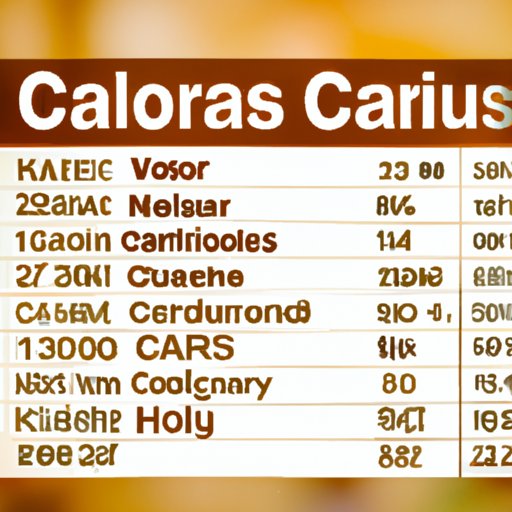Introduction
Losing weight can be a difficult and overwhelming process. There are so many factors to consider, including diet, exercise, and lifestyle. One of the most important aspects of a successful weight loss plan is managing your calorie intake. But how do you know how many calories you should eat to lose weight? This article will explore this question and provide some tips on how to create a calorie deficit for weight loss.
Calculating Calories: How Many Should You Eat to Lose Weight?
Calorie counting is one of the most effective ways to manage your weight. Knowing how many calories you need to lose weight can help you make informed decisions about your diet.
Estimating Your Calorie Needs for Weight Loss
The first step in determining your calorie needs for weight loss is to calculate your basal metabolic rate (BMR). Your BMR is the number of calories your body burns while at rest. To calculate your BMR, use an online calculator or consult with a health professional. Once you have your BMR, multiply it by an activity factor to get an estimate of how many calories you need to maintain your current weight.
Counting Calories for Weight Loss
Once you’ve determined your estimated calorie needs for weight maintenance, you can then adjust your calorie intake to create a calorie deficit for weight loss. The goal is to consume fewer calories than you burn each day. This will create a calorie deficit and cause your body to start burning fat for energy. The amount of calories you need to cut depends on your individual goals. Generally, a reduction of 500-1000 calories per day is recommended for safe and sustainable weight loss.
Eating to Lose Weight: What is the Right Amount of Calories?
It’s important to remember that everyone’s calorie needs are different. Factors such as age, gender, activity level, and medical history all play a role in determining how many calories you should eat to lose weight. Additionally, some people may need to adjust their calorie intake depending on their weight loss goals. For example, someone who wants to lose weight quickly may need to reduce their calorie intake more drastically than someone who is looking for gradual weight loss over time.
Creating a Calorie Deficit for Weight Loss
In addition to reducing your overall calorie intake, it’s also important to focus on the types of food you’re eating. Macronutrients such as proteins, carbohydrates, and fats all contain calories and can affect your weight loss success. Eating a balanced diet and focusing on foods that are low in calories and high in nutrients can help you create a calorie deficit for weight loss.
The Role of Macronutrients in Weight Loss and Calorie Intake
Proteins, carbohydrates, and fats are essential macronutrients that provide energy and fuel for your body. Each gram of protein and carbohydrate contains 4 calories, while each gram of fat contains 9 calories. This means that if you want to reduce your calorie intake, you should focus on eating lean proteins, complex carbohydrates, and healthy fats.
Understanding the Importance of Calorie Balance for Weight Loss
When it comes to losing weight, it’s important to understand the concept of calorie balance. In order to create a calorie deficit and lose weight, you must consume fewer calories than you burn. According to a study published in the Journal of the American Medical Association, “Maintaining a calorie deficit over time is the most reliable way to achieve sustained weight loss.”
Conclusion
Managing your calorie intake is an important part of any successful weight loss plan. Knowing how many calories you need to lose weight and creating a calorie deficit through diet and exercise can help you reach your goals. Additionally, it’s important to understand the role of macronutrients in weight loss and the importance of calorie balance. By following these tips, you can ensure that you are consuming the right amount of calories to lose weight safely and sustainably.
(Note: Is this article not meeting your expectations? Do you have knowledge or insights to share? Unlock new opportunities and expand your reach by joining our authors team. Click Registration to join us and share your expertise with our readers.)
